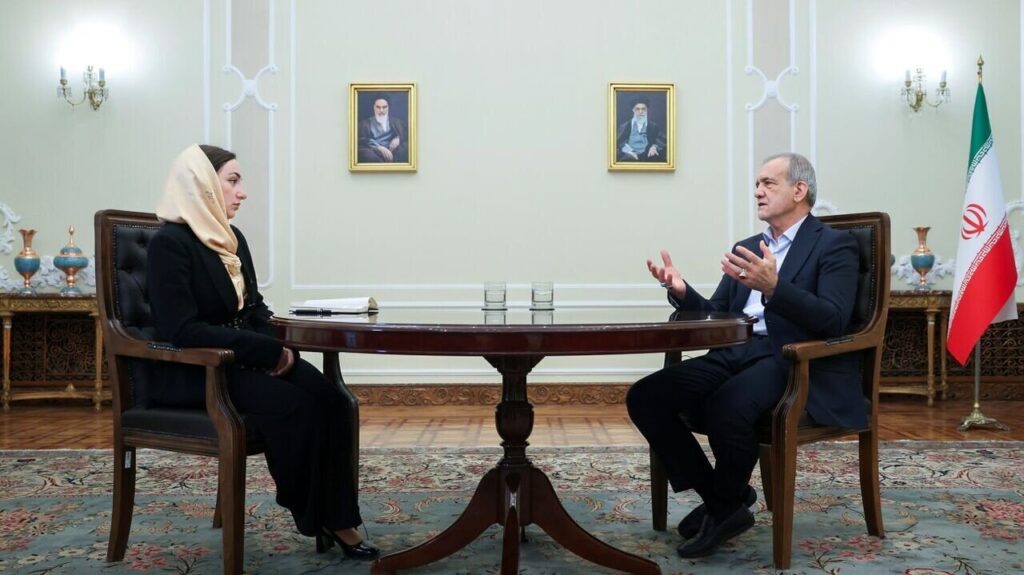Tehran – In a recent interview with Azerbaijan Television (AZTV), Iranian President Maud Pezeshkian expressed his unwavering commitment to Iranian principles of international law, particularly the integrity of the rights and territorial entities of all countries, calling it “principles of first and first international law.”
His remarks, in the background of the ongoing conflict between Armenia and Azerbaijan, underscored Iran’s role as a mediator and advocate for peaceful settlements in the region. Pezeschkian emphasized that compliance with these fundamental principles is paramount to maintaining stability and preventing conflicts arising from territorial ambitions, saying, “We must respect the integrity of each other’s territorials and respect the desire for the territorial.”
Addressing the specific context of the Armenia-Azerbaijan conflict, President Pezeshkian reiterated Iran’s longstanding position that should be resolved through dialogue on territorial boundaries and mutual respect. He warned against unilateral attempts to seize territory, arguing that such actions were the underlying cause of instability and conflict, adding that “the conflict begins when the conflict wants to take over another person’s land.” The president affirmed Iran’s support for the peace process between the two countries, saying that Iran, along with other international actors, is aware of and adhere to the established international framework to resolve the notable differences between Baku and Yerevan.
He explicitly stated that Iran has consistently defended Azerbaijan’s rights and is defending Armenia’s rights within the same framework of international law and respect for sovereignty.
Beyond the immediate context of the Armenia-Azerbaijan situation, President Pezeshkian highlighted the deep and growing relationship between Iran and Azerbaijan. He characterized Azerbaijan as a second home for Iranians, highlighting the shared cultural and historical connections. In anticipation of an official visit to Azerbaijan, he expressed a sense of familiarity and belonging, noting that despite physical boundaries, the two countries remained closely connected as neighbours. He clarified his intention to engage in discussions with President Ilham Aliyev, Azerbaijani’s counterpart, on a wide range of issues aimed at further strengthening bilateral relations, saying, “Neighbors don’t always separate the walls because we never feel alienated there, but they still have the walls together.”
He imagines a future in which the two countries actively support and complement each other’s development through strengthening communication and cooperation, adding, “We can communicate and help each other when we consider our capabilities and skills in terms of science, economics, industry, culture, health, medicine and trade.”
President Pezeshkian has expressed optimism and progress on a critical infrastructure project aimed at establishing land connections between mainland Azerbaijan and the Naktiban region via mainland Azerbaijan and Iranian territory. He said the project is moving forward at a rapid pace and is already working together to promote the creation of a seamless land link that connects Azerbaijan’s mainland through Iran to the Naktiban. He further noted the importance of the rail route currently under discussion, strengthening trade, cultural and economic ties between the two countries and as part of a wider north-south transport corridor.
In addition to transportation infrastructure, President Pezeschkian highlighted the possibility of cooperation in the energy sector, particularly in the area of green energy. He noted the opportunity to utilize clean energy from existing dams and dams currently under construction, and presented a pathway for sustainable energy cooperation between Iran and Azerbaijan, saying “clean energy can be obtained from existing dams and parts of them under construction.”
President Pezeshkian concluded his remarks by highlighting the common perspective and common foundation between Iran and Azerbaijan at organisations of Islamic cooperation and international forums such as the United Nations. He highlighted the possibility of close cooperation in a variety of multilateral organizations, including BRICS, Shanghai Cooperation Agency and Eurasian Economic Union, and concluded that “connections, strengthening the BRICS, Shanghai Cooperation Agency and Eurasian Economic Union are the next step in cooperation.” His overall message conveyed strong commitment to regional stability, peaceful resolution of conflicts and strengthening bilateral relations between Iran and Azerbaijan across a wide range of regions.

